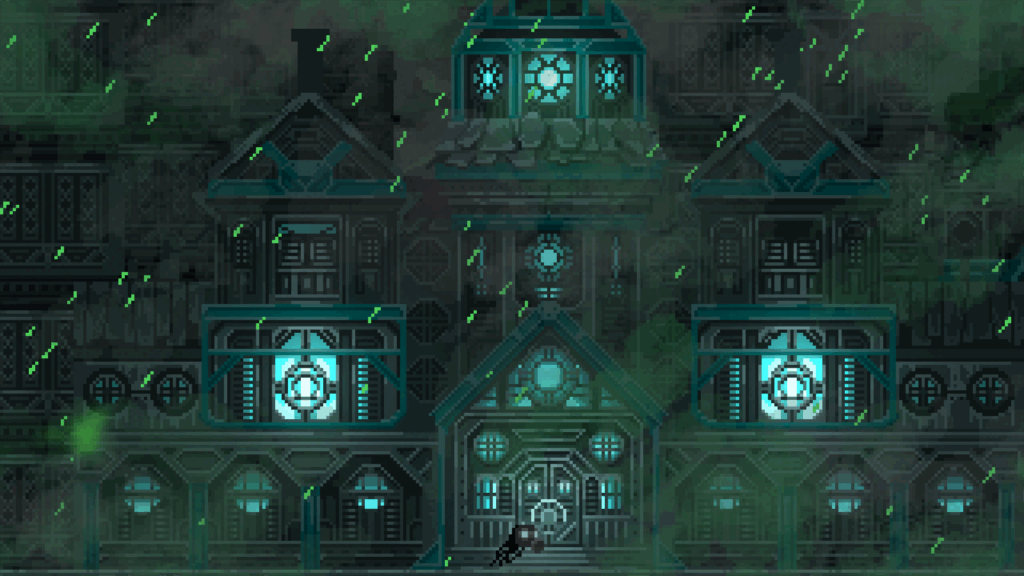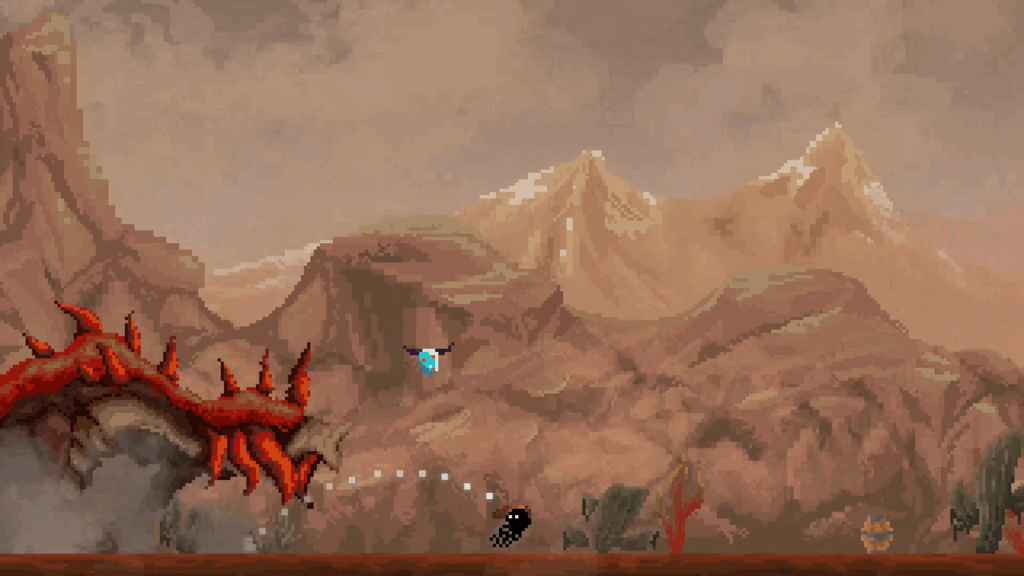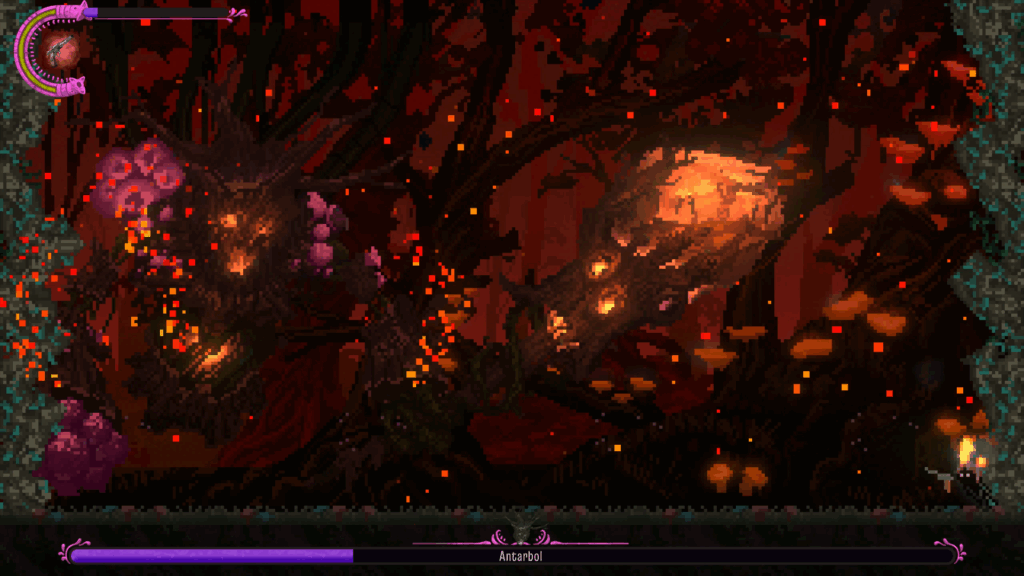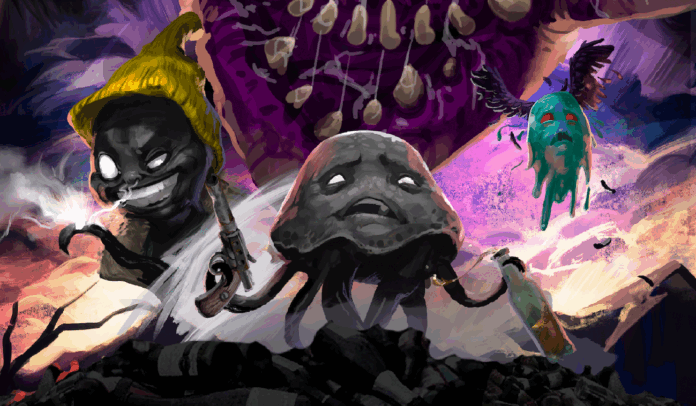When Spanish indie studio Hungry Pixel began development on NetherWorld in 2016, they weren’t planning to spend nearly a decade shaping one of the strangest, rawest games out there. Yet here they are in 2025, finally wrapping up their debut title. NetherWorld is a surreal, side-scrolling action-adventure about a jellyfish named Medoo, whose personal marriage crisis spirals into a darkly comic, psychedelic journey through vodka-soaked bars and coke-fueled wizardry.
For writer and narrative designer Albert Serra, this prolonged creative odyssey has been powered by three essential forces: “The team, who has lived and shared the good and bad times of the development together. Our families (human and non-human), who let, or rather forced, us to disconnect from the computer to touch some grass. And, of course, our Kickstarter backers. Every positive feedback we’ve received has helped us a lot in maintaining the motivation to finish the project, especially during hard times.”
And there were plenty of hard times along the way. Like that particular painful one that nearly spelled the end. “Damn, we even remember the date: Wednesday, November 18, 2020,” Serra recalls. ‘Half of the game has been deleted’ was the grim verdict after a backup error corrupted core files, turning their Unity engine into a blank pink screen. It was a breaking point. “Some of us even considered leaving the project,” he admits. But instead of quitting, the team took the setback as an opportunity to rebuild. “We cut content and rebuilt the code in a much more robust, simplified and scalable way,” Serra says. “Our backers’ unconditional support made it possible.”
Dark and Decadent
The initial concept of NetherWorld was just as chaotic as the game itself. It all started with a question posed by Dan Barreno, the game’s original creator and main programmer: “What would the darkest and most decadent version of Undertale look like?” Inspired by that idea, Barreno began coding a simple prototype about a heartbroken guy stumbling into a surreal, vice-drenched adventure. “Somehow that guy turned out to be a jellyfish,” Serra laughs.

When Serra joined in 2017, he inherited a world of ideas and fragments and was tasked with creating some sort of logical narrative out of the chaos. “I took everything Dan had in mind, scribbled on half a Word page, plus some character sketches and mechanics, and tried to build a crazy-but-internally coherent world,” he explains. The resulting script ballooned from a planned five hours of gameplay to over 15. “Oops,” Serra adds. But every extreme twist, every deranged minigame or character was always evaluated with purpose: “We asked ourselves if it made sense in what we were trying to tell. Humor, and especially black humor, has to be rationed to be more effective.”
Fully remote
That careful chaos extended to the team’s structure. Despite being spread across Spain and even the U.S., Hungry Pixel has always operated remotely. “We’ve always worked fully remote because we all live in different parts of Spain, so having a physical office didn’t make sense,” Serra explains. “If we lived in the same area, tho… Nah, we wouldn’t have money to pay for it, so remote is fine!”

The team itself grew organically over time, driven more by passion than planning. “Dan started as a solo dev… then met Isabel ‘Erien’ Armentero on a dev forum and loved her art,” Serra recounts. Over the years, the core expanded to include co-founders, freelance programmers like Boss fight specialist Xavi Farré, artists, and musicians like Rogue Sonics from Pennsylvania, who reached out with a boss track they’d composed on spec. “We were very surprised how they nailed the game’s vibes,” Serra says. “We asked them to work together, of course.”
Not healthy
Still, creating NetherWorld was never a full-time job. “We’ve all been combining NetherWorld development with other jobs to basically pay the rent or just live,” Serra admits. That financial constraint, along with the 2020 data loss, the COVID-19 pandemic and general inexperience, extended the timeline far beyond their original expectations. “Between our inexperience, external/internal events and regular development bugs, the development increased its scope a lot. That’s not healthy, by the way.”

Things only began to shift in 2023, when the team finally secured a publishing agreement with Selecta Play. “That gave us the necessary boost to really feel we were reaching the last stage of development,” Serra says. With a schedule locked and marketing help underway, NetherWorld is now on track for release in the second half of 2025.
Extremely robust code
So, what are they most proud of? It’s not just the bizarre narrative or twisted humor, but the underlying design architecture. “We’re very proud of how Dan built an extremely robust code system that allowed us to create, adapt and expand all kinds of cinematics and interactions without breaking the game,” Serra notes. He also praises the game’s layered mechanics and art direction: “In NetherWorld, we’ve always tried to surprise the player using all the resources available: mechanics, characters, scenarios.”

“Plus, Alex Fariña’s pixel art and HD UI illustrations are amazing,” he says. That unique pixel art style wasn’t just a practical choice, according to Serra it was a statement. “Dan was totally in love with pixel art and we want to vindicate pixel art not just as a ‘retro game style’, but as a timeless art form.”
Sacrifice your life
Much of the game’s funding came from a successful 2018 Kickstarter campaign that doubled its €5,000 goal. But with no funds for salaries, everyone kept other jobs while development continued in their spare time. Selecta Play’s support in 2024 helped significantly, especially with marketing, merchandise and physical editions. In the end though, as Serra keeps saying, it was the community that kept the team going. “The project was always about commitment. To the story, to each other and to our amazing backers.”

And after nine years, what’s the biggest lesson they’ve learned? Serra doesn’t hesitate: “Please control the scope of your project. Start small. Establish limits, not just on size, but on your mental health. If you decide to sacrifice your personal life for a project, at least set a reasonable deadline or you’re gonna die in the process.” He adds one more sober reminder: “Believing in the success of a project doesn’t mean it’s gonna be successful. You have to be mentally ready for both outcomes.”
NetherWorld is out now on Steam and Nintendo Switch. You can still play play the demo on Steam.
This article was first published on 11 June 2025.

